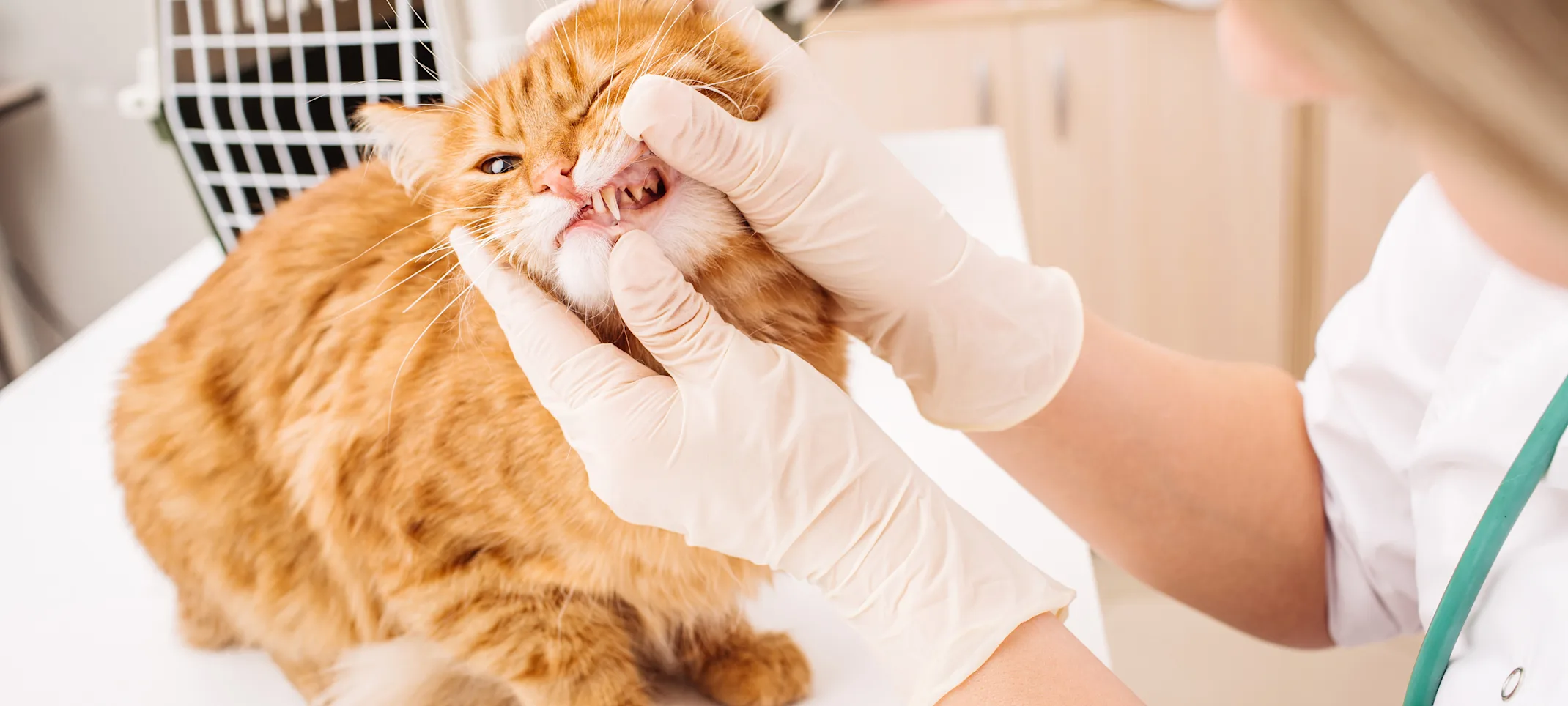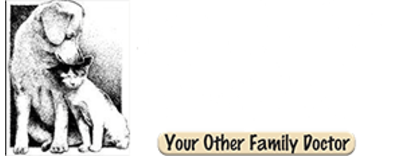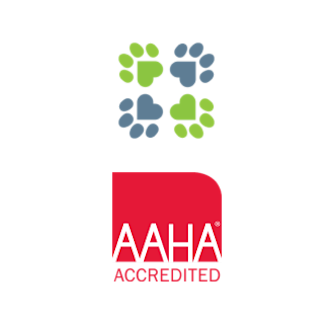Family Pet Hospital
Dentistry
Annual dental exams and cleanings are recommended to protect your pet from many health problems and help them maintain a healthy and clean mouth.

Veterinary Dentistry in Edmond, OK
Overview
Studies show that 50% of all dogs and cats have some form of periodontal disease. That number jumps to 80% in pets that are 3 years of age or older. If left untreated, periodontal disease can cause infection, pain, and tooth loss over time. It can also lead to serious health problems like microscopic changes in the heart, liver, and kidneys. Because of this, we recommend an annual veterinary dental healthcare examination for all pets.
Why do pets need dental care?
Many health problems start in the mouth. Plaque, tartar, periodontal disease, and infected teeth serve as a source of inflammation and infection for the rest of the body.
Dental disease is one of the most common problems that we see in dogs and cats. It can cause drooling, reluctance to eat, swelling, bad breath, redness of the gums, loose teeth and tooth discoloration.
Periodontal Disease Prevention & Therapy for Your Pet
Periodontal disease is a common condition that affects nearly 80% of dogs and 70% of cats that have gone without proper dental care by age three. Unlike humans, our canine and feline friends do not get cavities; however, they are extremely susceptible to plaque, tartar, and gingivitis.
Periodontal disease can cause serious issues in your pet's health, including:
Infection
Fractured, missing, or broken teeth
Bad breath
A refusal to eat due to pain in the teeth and gums
Personalized Periodontal Therapy
There are four stages of periodontal disease, ranging from mild gingivitis to advanced severe periodontitis. An exam by your veterinarian will allow them to make a determination of the stage of disease and create a treatment plan to reverse the adverse effects. Routine preventive care can also slow the progression of periodontal disease.
The veterinarians and staff at Family Pet Hospital will be happy to help you find the proper preventive care routine for your furry friend!
Periodontal Disease Progression
The formation of plaque begins as soon as puppies and kittens begin to develop their adult teeth. This plaque is a soft film formed by food particles, saliva, debris, and bacteria. All of which is inevitable to your pet and is impossible to prevent. This plaque acts as a binding agent for minerals, in which tartar begins to form.
Tartar is noticeable by a hard yellow-brown substance that is attached to the teeth. This tartar causes an inflammation of the gums, which, if left untreated, will cause an infection of the gums (or gingiva) known as gingivitis. As tartar continues to form over time, the condition worsens. The gums begin to swell and turn red, and your pet's eating habits and behavior could change.
Eventually, the disease will begin to decay and destroy the gums, teeth, and bones in the mouth. Bacteria will spread into the bloodstream and progress throughout the pet's entire body, causing damage to the liver, kidneys, and heart. Preventive care and routine periodontal prophylaxis and therapy can prevent the disease from progressing to serious stages and is reversible if done at early stages.
When should I seek dental care for my pet?
Dental issues and dental-related diseases can easily be prevented by visiting our veterinarians regularly for dental examinations and cleanings. We take a comprehensive approach to dental care including dental health assessment, treatment, and prevention.
Preventive Care
Preventive home care is the best option to slow the progression of periodontal disease. The proper diet is a great first step in home care. Feeding a dry hard kibble diet to your pet will benefit your pet's periodontal health Unlike moist canned foods, the mechanical action of chewing the kibble produces a gentle abrasive effect, providing a brushing result that reduces plaque accumulation.
Special periodontal care foods are also available at Family Pet Hospital. These contain healthy materials that block the tartar buildup, and are larger kibble pieces that require more mechanical chewing action by your pet. Dental chews are also a great preventive to add to your home care routine. Special dental chews that contain clinically proven enzymes provide a barrier against plaque while also having the benefit of the mechanical chewing action to clean your pet's teeth.
The best most effective home care is routine daily brushing. Although this seems like a difficult task, with patience and perseverance your pet will begin to enjoy this experience and look forward to the daily event! An Edmond veterinarian or technician at Family Pet Hospital can help instruct you on how to achieve success through daily brushing.
Please note that a special and inexpensive canine or feline toothpaste must be used. Do not use household human toothpaste, as this is harmful to your pet.
Prophylaxis & Therapy
Routine prophylaxis and therapy is essential to your pet’s health. Daily home care will temporarily prevent the need for extensive treatment, but almost every pet will require therapy at some stage of their life.
Your veterinarian at Family Pet Hospital is also your pet’s dentist! Periodontal therapy is an anesthetized procedure, where your pet will have pre anesthetic bloodwork done to ensure they are healthy enough to go under anesthesia. A cleaning of your pet's teeth will then be completed using an ultrasonic scaler, removing all tartar including the subgingival tartar. Dental radiographs, full mouth radiographs, tooth polishing, a detailed examination of each tooth to ensure they are intact and healthy, and any needed tooth extractions can also be performed. If excessive gingivitis is present, pre- and post-procedure antibiotics may be needed.
Periodontal therapy is an outpatient procedure, and your best friend should be back home the same day as treatment! A Family Pet Hospital veterinarian or technician will explain the procedure in more detail prior to your scheduled appointment.
Edmond Dental Cleaning Services for Pets
Give Your Pet a Healthy Smile
When we think about our pets’ health, we often forget about a vital part of their wellbeing – their dental care. As a species that are routinely taught to brush our own teeth twice a day, we really ought to make more effort to ensure that our animals’ teeth are as healthy as our own.
Some of the symptoms of poor oral care in pets include:
Weight loss because infected gums and tooth pain can result in a reduced appetite.
Bad breath due to neglected teeth and gums.
Dirty, stained teeth that could harbor bacteria.
Heart, kidney, and liver disease which can all arise from untreated dental infections.
Premature death because bad teeth and gums can shorten your pet’s life expectancy.
One of the primary causes of these problems is gum disease which sees bacteria-harboring plaque and tartar accumulate on your pets’ teeth. This can infect the gum tissue, causing pain and potential tooth loss. The bacteria can also enter the blood stream and cause damage to internal organs, which, when left untreated, can lead to organ failure and death.
Cats
Research has shown that dental disease is the primary health concern for cats, with around 70% of felines over three years old experiencing some form of dental problem. At between four to six months old, kittens lose their baby teeth and develop their permanent ones. Once the permanent teeth are present, your cat should have around 30 teeth total.
Some of the symptoms of dental disease in cats include:
Bad breath
Broken or missing teeth
Drooling
Blood in the saliva
Discolored teeth
Receding gums
Bleeding, red, or swollen gums
Decreased appetite
Weight loss
Dental prophylaxis, otherwise known as a clean and polish, is the most routine dental treatment performed on cats. It usually takes around 60 minutes and there is no need for your cat to stay with us afterwards. While all dental work requires that your pet has general anesthetic, the risks are minimal and we can perform a pre-anesthetic screening test if requested or required. Once your cat is under sedation, we will perform an oral examination before commencing with cleaning and polishing. If any radiographs or extractions are required, we will do them at this time.
It is vital to carry on your cat’s dental care at home. There are a variety of brushing kits available that usually include a finger brush, small pet toothbrush, and special toothpaste. Never use human toothpaste on your pets’ teeth. Make brushing your cats’ teeth an integral part of their daily routine to ensure that you are providing the best preventative care for dental disease possible.
Dogs
Doggy dental care in Edmond is also extremely important. Most adult dogs will have 42 teeth by the time they are 7 or 8 months old but many show signs of gum disease by the time they are 4 years old due to a lack of proper cleaning.
Symptoms of poor dental or oral health can include:
Excessive drooling
Loose teeth
Inflamed or red gums
Tumors in the gum
Cysts under the tongue
Excessively bad breath
As with cats, brushing your dogs’ teeth as a part of their regular daily routine can help prevent the onset of oral decay. There are plenty of canine brushing kits available, or you could use gauze wrapped around your fingers. Again, make sure you purchase special pet toothpaste as human toothpaste can make your pup very sick.
How does it work?
Teeth Exams, Cleaning and Polishing
Dog and cat dental cleanings are very similar to human dental cleanings, except that we are required to use anesthesia to properly and safely examine and clean the teeth. After the cleaning, our veterinarians perform a thorough oral exam and check for signs of disease like gum loss, root exposure, or pockets around the root.
Also similar to human dentistry, we do full mouth radiographs (x-rays) of your pet. This allows our veterinarians to be able to evaluate the roots of your pet's teeth as well as any disease or abnormalities that are located below the gum line and not visible on examination alone.
Tooth Extractions
We make every effort to save teeth that we feel have a chance to be successfully treated. In many circumstances, however, periodontal disease is so advanced that treatment without extraction is unsuccessful. We only extract teeth that in the doctor's opinion are beyond saving.
Minor Oral Surgery
Many teeth require oral surgery to safely remove each individual root. We have extensive training and experience to perform these procedures properly. Pain medications are administered in clinic and provided for in-home aftercare.

